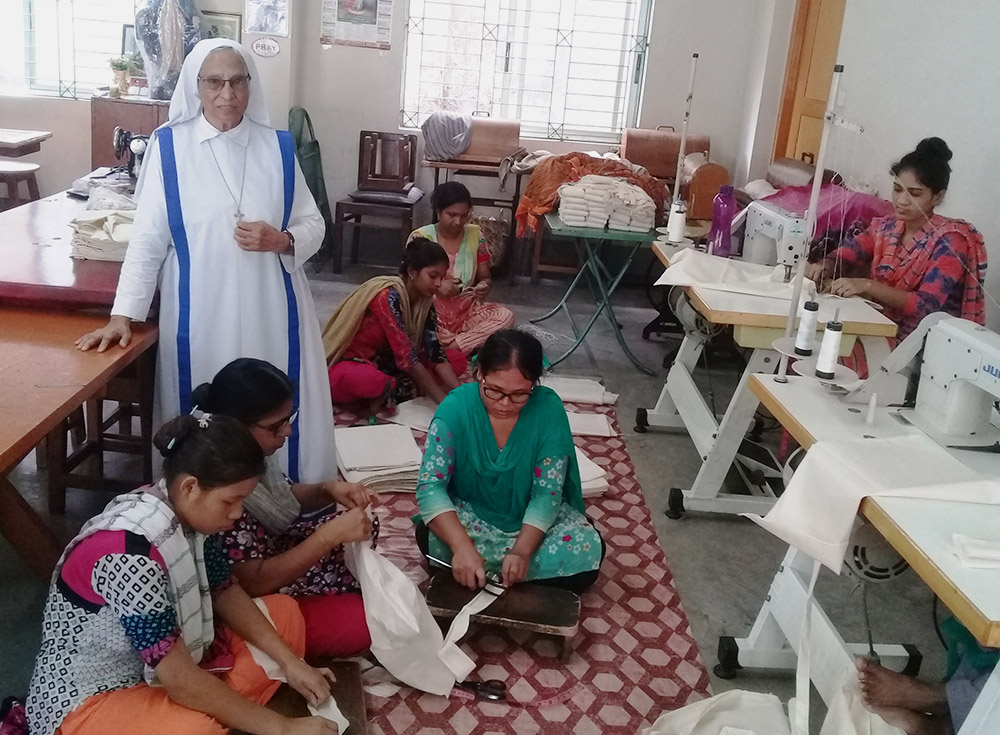
Sister Mary Lillian with artisans of CORR-The Jute Works in Dhaka, Bangladesh (Sumon Corraya)
On Sept. 12, CORR-The Jute Works (CJW) celebrated its golden jubilee in Dhaka. Sister Mary Lillian, a nun with the Associates of Mary Queen of the Apostles, and American Holy Cross Fr. Richard William Timm founded CJW in 1973. Around 1,000 people, including Catholic bishops and Bangladesh's minister of textiles and jute, participated in the jubilee program.
Today, more than 6,000 women produce jute and other products and become self-supporting. They also make woven baskets, candles, rings, earrings, handbags, hand-painted squares, terracotta figurines, rugs, wooden trays, and Christmas and thank-you cards.
The guiding principle of CJW is capacity-building of marginalized people, especially women, people with disabilities and Indigenous people, ensuring trade justice, market access and improved living standards.
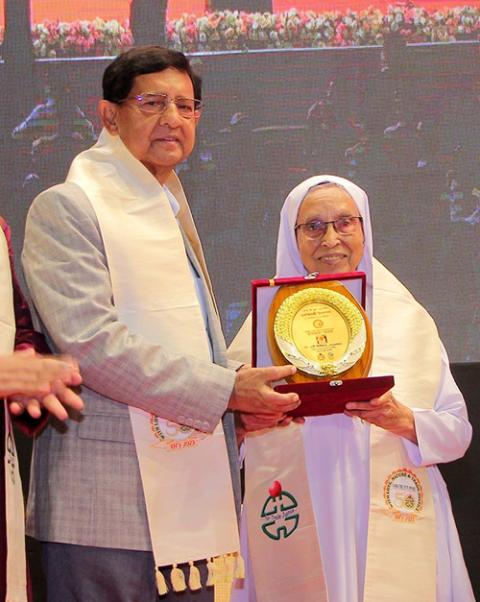
Sister Mary Lillian receives an honor for her lifelong contributions to CJW from Bangladesh's minister of textiles and jute, Golam Dastagir Gazi. (Sumon Corraya)
Golam Dastagir Gazi, minister of textiles and jute for Bangladesh, was present as chief guest in the jubilee program. He said, "The CJW has been creating employment for poor women since 1973. They are pioneers in producing jute products in Bangladesh. We [the Ministry of Textile and Jute] should learn from CJW."
Sister Mary Lillian, 93, has spent most of her life providing skills training with CJW. She is a lifetime trustee of the organization and still offers hands-on training.
She told Global Sisters Report, "I enjoyed helping women in need to make them self-supported, and I became happy to see their life's transformation. The CJW is like a part of my body."
GSR: Why did you establish the CJW?
Sister Mary Lillian: I became a nun on Jan. 6, 1951, and until 1967, I served as a schoolteacher. In 1968, my congregation appointed me to the Jagorani Handicraft Center [jagorani means "awaking"]. I produced jute products with the poorest women, besides providing them with skills training.
In 1971, during the liberation war of Bangladesh with Pakistan, thousands of women became widows.
Advertisement
Fr. Richard W. Timm was the planning officer of Caritas Bangladesh. He met me and asked to establish CJW. He told me that after the liberation war, people were facing a lack of food. We needed to help people from famine.
At first, CWJ was a project of Caritas Bangladesh, and later it became a trust.
Who was involved with you to make this project successful?
In January 1973, a young American designer, Louisa Brooke, came to Dhaka. She gave training to rural women on jute products and other crafts. She stayed in Bangladesh for two months with us. We started making huge [quantities of] jute products and other crafts products.
I became worried about where I would sell these. One day, Pastor Peter McNee, a missionary from New Zealand who stayed in Chandpur, the Southern part of the country, came to the Jagorini Handicraft Center. I told him I was struggling to sell the jute and other handicraft products. I also told him that if we cannot sell these, poor women will not get paid and will face a severe food crisis.
McNee gave me 10,000 Bangladeshi takas as an advance. He and his wife brought our products to New York and started selling them in the street.
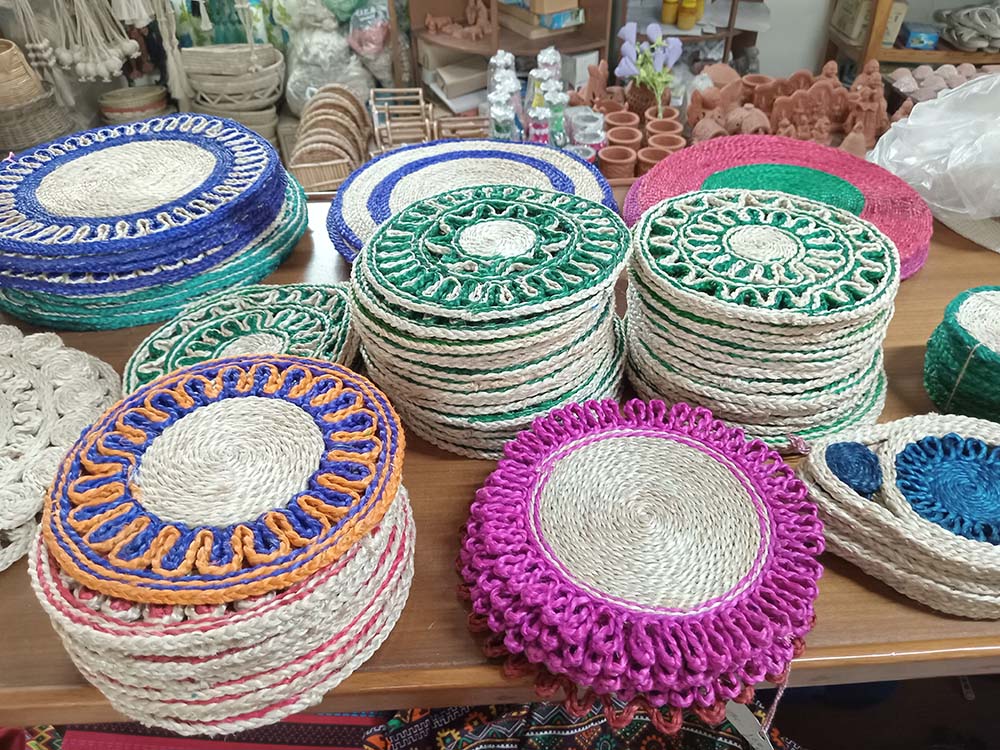
Jute crafts made by CJW artisans (Sumon Corraya)
These kindhearted people worked for us. Peter voluntarily took the responsibility of finding foreign markets for our products. He was involved with us for some 10 years. The CJW will remember him forever for his contribution. Without his collaboration, we could not have been successful.
Currently, CJW exports its products to around 30 countries, such as the U.S., U.K., Italy, France, Australia, Canada, etc.
What challenges did you face with CJW?
Fifty years ago, women rarely left their homes in this Muslim-majority country. When we visited villages, most of the men neglected us. We tried to make them understand that we would provide their wives with skills training to make money. Few husbands allowed us.
When their wives started earning money, they became very happy. Gradually, many women joined us, and now we don't face such problems. We get invitations and appeals from many places to go there to conduct training for women in need.
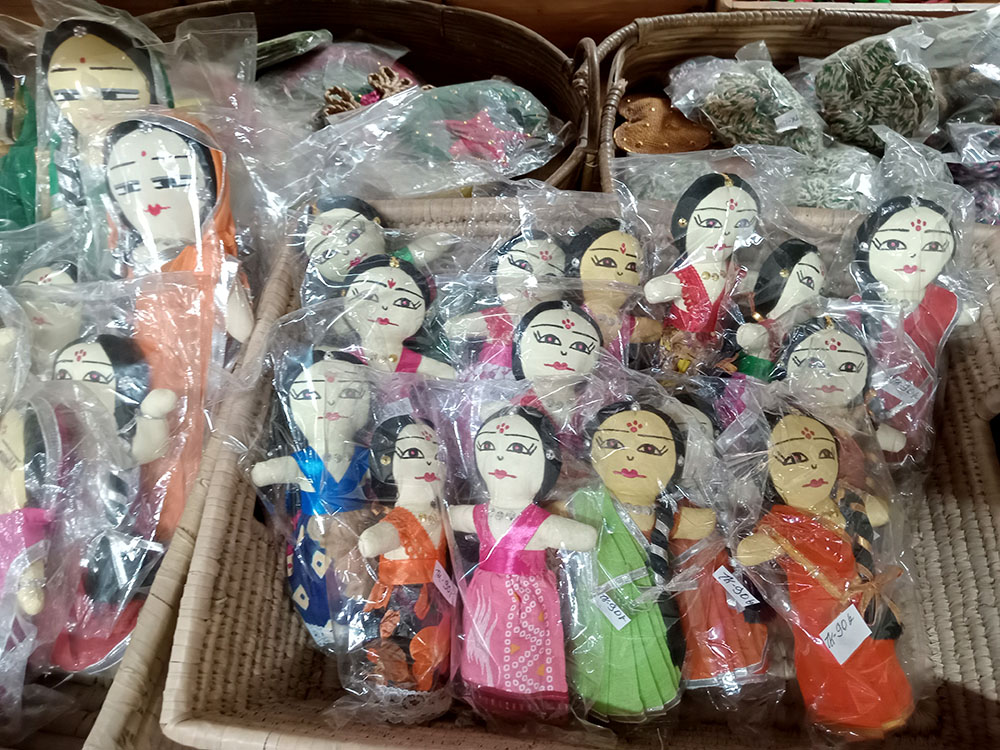
Jute crafts made by CJW artisans (Sumon Corraya)
As a young nun, I went to markets to sell their products. After selling the jute products, I would give the money to the artisans. Later, we started exporting our products to different countries.
We never compromised with product quality. That's why we get return customers.
How do you feel when you see thousands of women become self-supported and change their lives?
I become happy when I see people becoming financially developed. Bashonti Costa was a jobless housewife who was in need. By becoming involved with us, she started making jute products. She educated her children, and her [daughter] later became a professor at a university.
As far as I know, the mothers of 30 priests, nuns and brothers were involved with CJW. Many are still involved with us.
Many former artisans didn't have any land, but now they purchased land. Many didn't have brick houses, but they made strong houses. Our initiative was small for the poor, but now we are seeing that its impacts are huge. It makes me happy.
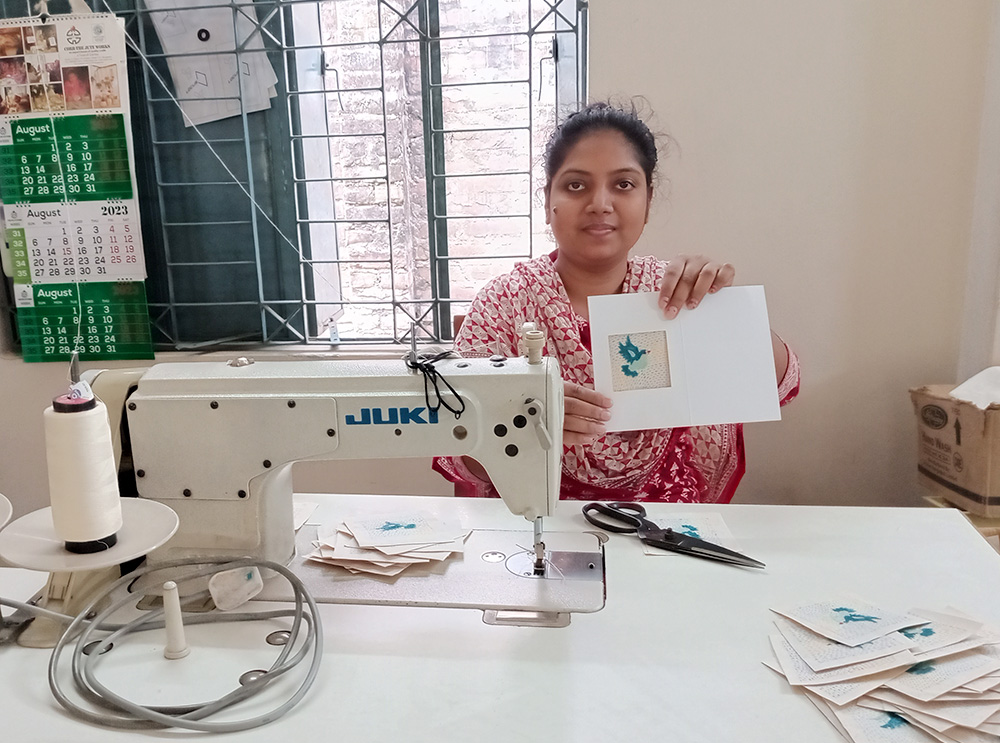
Bithi Rozario, an artisan of CJW, makes Christmas cards. (Sumon Corraya)
CJW also has a security fund for its artisans. When artisans become old and cannot work anymore, they get money from a security fund. It helps our artisans in old age live with dignity with their families.
What is the beauty of CJW?
The CJW's beauty is that it helps women become self-reliant and live with their families and in society with respect. Secondly, we mainly produce products with elements collected from nature.
Jute is the main element of our products. In Bangladesh, it is called golden fiber. Plenty of jute grows in our country. We are using a local resource that is environmentally friendly. We are earning remittance from this resource by exporting our jute products.
Additionally, we produce candles and clay-made products that also come from nature.
I personally benefited from this organization. People love me very much. I get to love and honor. Although I was not very educated, almighty God gave me the wisdom to work for his people.
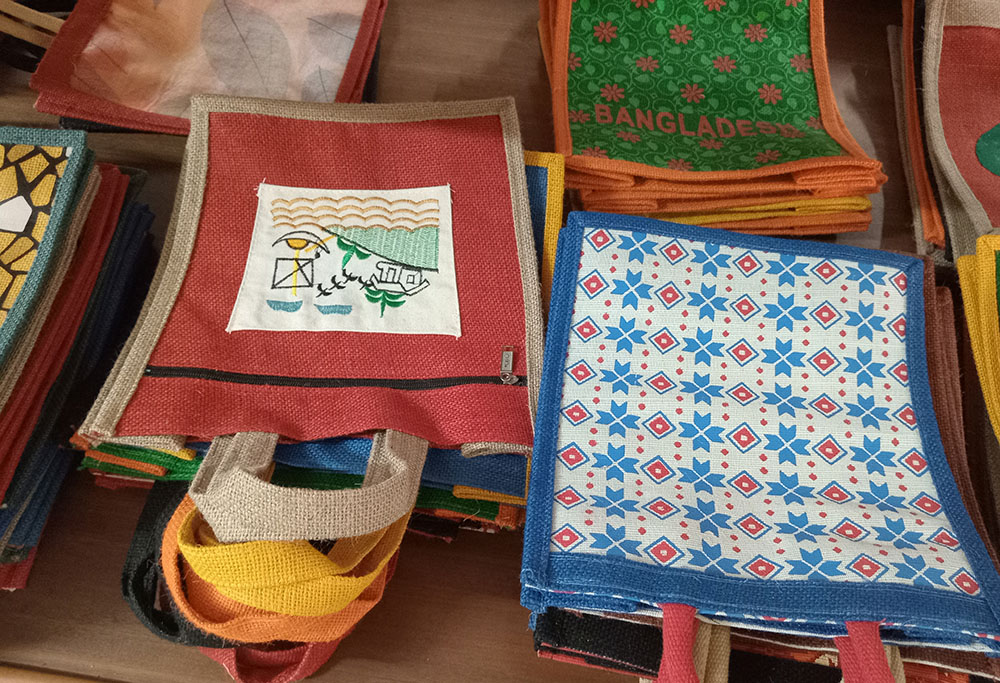
Jute crafts made by CJW artisans (Sumon Corraya)
As a nun, how do you preach the teachings of Jesus Christ in this Muslim-majority country?
Seventy percent of our artisans are non-Christians. I always start a meeting or training with a prayer to almighty God. I read the Bible and preach to them. I tell them to practice love and forgiveness in life.
However, I never tell anybody to become a Christian, but many non-Christians give me their prayer intentions and ask me to pray for them. They ask for prayer for their illnesses, childlessness, peace [in the] family, etc. Interestingly, many of them have their prayers answered and give me thanks.
Can you please tell us about your personal life?
When I was only 13 years old, my father arranged a wedding for me. But I had a desire to be a nun. I met my parish priest (I forgot his name) and asked him to stop my wedding. He stopped my wedding, although the engagement was already made. My parish priest canceled my wedding and sent me to a formation house.
I observed the Canadian Holy Cross Sisters who served in our Padrishibpur Parish of the Barishal Diocese. Their lifestyle and good behavior attracted me to enter into formation.
I reached 72 years of consecrated life. I was very happy in my religious life, and still am. I thank God for such a beautiful and blessed life.





